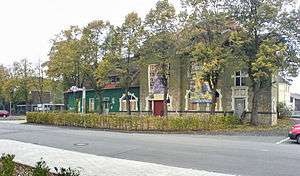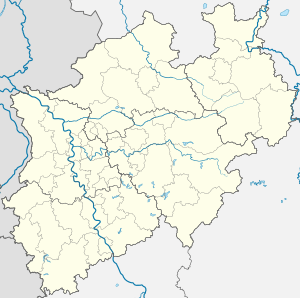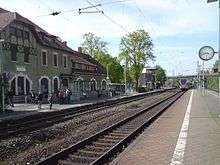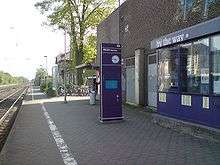Münster-Hiltrup station
Münster-Hiltrup station is a suburban station in the district of Münster-Hiltrup in the city of Münster in the German state of North Rhine-Westphalia. It is served by regional trains between Munster and Hamm and is an important station for commuters and students. The station is conveniently located between central Hiltrup and Hiltrup Ost. In addition, the station is served by several city bus lines.
| Bf | ||||||||||||||||||||||||||
 | ||||||||||||||||||||||||||
| Location | Bergiusstr. 5, Münster-Hiltrup, North Rhine-Westphalia Germany | |||||||||||||||||||||||||
| Coordinates | 51°54′17″N 7°39′17″E | |||||||||||||||||||||||||
| Line(s) | ||||||||||||||||||||||||||
| Platforms | 3 | |||||||||||||||||||||||||
| Other information | ||||||||||||||||||||||||||
| Station code | 2771[1] | |||||||||||||||||||||||||
| DS100 code | EUN[2] | |||||||||||||||||||||||||
| IBNR | 8002841 | |||||||||||||||||||||||||
| Category | 5[1] | |||||||||||||||||||||||||
| Website | www.bahnhof.de | |||||||||||||||||||||||||
| History | ||||||||||||||||||||||||||
| Opened | 1907 (original station in 1868) | |||||||||||||||||||||||||
| Traffic | ||||||||||||||||||||||||||
| Passengers | about 2,500 | |||||||||||||||||||||||||
| Services | ||||||||||||||||||||||||||
| ||||||||||||||||||||||||||
| Location | ||||||||||||||||||||||||||
 Münster-Hiltrup Location within North Rhine-Westphalia  Münster-Hiltrup Location within Europe  Münster-Hiltrup Münster-Hiltrup (Europe) | ||||||||||||||||||||||||||
History
In 1848, the Munster Hamm Railway Company (German: Münster-Hammer Eisenbahn-Gesellschaft) finished the Münster–Hamm railway. On 28 May of the same year it opened Diecke Wief station on the route. Due to its poor situation on the northern edge of the Hohe Ward forest and the long walk to the old village (now Hiltrup Mitte) the station was moved on 1 August 1868 to its present location.
In October 1879 a separate freight yard was added. It was particularly important after the opening the Glasurit factory (which manufactured varnish) in 1903. The plant had its own siding, as did the Rockwool factory (a manufacturer of insulating material), which was built later.
As a result of increasing passenger and freight traffic, a new larger station building was opened in 1907. The station building, which still stands, possessed, among other things, a waiting room and ticket office.
The station, which survived the Second World War unscathed, lost importance in the decades that followed. BASF Coatings (which had taken over the Glasurit company) closed its own rail siding in favour of truck freight, leading to the closure of the freight yard. A new station building with a small ticket office and automated signalling was built next to the old station building, which was eventually closed.
Current operations


Today about 100 train stop at Hiltrup station, which is used daily by about 2,500 passengers. It has four tracks in the station area, three of which are accessible from platforms. The fourth belonged to the former freight yard and is not used anymore. Through traffic currently runs mainly on tracks 1 (towards Hamm) and 2 (towards Munster). Track 3 is only used as required. The station has two ticket machines for regional transport and one for long distance services. Since late 2009, both platforms have an electronic passenger information display.
Münster-Hiltrup station is served by three regional services: an hourly service of the Rhein-Münsterland-Express (RE 7) and a half-hourly service of the combined RB 69/RB 89 Ems-Börde-Bahn Regionalbahn service, which is uncoupled in Hamm.[3]
References
- "Stationspreisliste 2020" [Station price list 2020] (PDF) (in German). DB Station&Service. 4 November 2019. Retrieved 15 November 2019.
- Eisenbahnatlas Deutschland (German railway atlas) (2009/2010 ed.). Schweers + Wall. 2009. ISBN 978-3-89494-139-0.
- "Münster-Hiltrup station". NRW rail archive (in German). André Joost. Retrieved 17 April 2016.